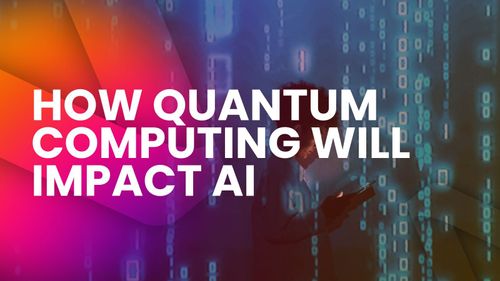
As the world embraces the fusion of quantum computing and artificial intelligence, the education sector stands on the brink of transformative change. These advancements hold the potential to revolutionize how we teach and learn. However, their integration raises important questions about the role of technology in education and the limits of automation.
On the one hand, quantum will allow students to engage in far more advanced and engaging activities. However, as with any AI application, there’s a risk of harming the vital peer-to-peer touchpoints during a student’s education.
How Can Quantum Computers Advance Education?
Quantum computers, with their unparalleled computational power, could significantly advance education by enabling the rapid analysis of complex data sets. For instance, personalized learning systems could leverage quantum algorithms to process and adapt to individual learning patterns in real time.
This could lead to the development of highly customized educational experiences, ensuring every student receives support tailored to their needs. Moreover, quantum computing could enhance simulations in subjects like physics, chemistry, and biology, providing students with deeper insights into complex scientific phenomena.
How Can AI Be Used in Education?
AI already plays a pivotal role in modern education, with many schools, colleges, and universities making the most of:
Intelligent tutoring systems
Intelligent tutoring systems
Platforms like adaptive learning software use machine learning to adjust content difficulty based on a student’s performance, providing bespoke experiences that reflect the students skillset and preferred learning style.
For example, 65% of people learn best through visual mediums. Quantum AI can help educators provide tailored resources for this 65% while adapting activities to rely less heavily on visual elements for the remaining 45%.
Predictive analytics in schools
Similarly to how predictive analytics helps retail brands drive efficacies and predict market demand, in schools predictive analytics can be used across a variety of areas:
Predicting student absent levels during extreme weather or social events
Predicting individual student performance based on past data of similar students
Identifying weak points in lessons, the teaching syllabus, and more.
AI can also automate administrative tasks, such as grading and scheduling, allowing teachers to focus more on instruction and mentorship.
What is the Argument Against AI in Education?
Despite its potential, the integration of AI in education is not without controversy. Critics argue that over-reliance on AI tools may undermine critical thinking and creativity by encouraging rote learning.
Additionally, issues of data privacy and bias in AI algorithms raise concerns about equitable access and fair treatment of students. The potential for economic disparity between schools that can afford advanced AI systems and those that cannot further exacerbates the digital divide.
While predictive analytics can help us understand which students are more likely to struggle with specific tasks or topics, it’s vital that the AI is thoroughly trained to avoid bias.
Will AI replace teachers?
While AI can enhance educational outcomes, it cannot replace teachers. Teaching is not just about delivering content; it’s about fostering relationships, empathy, and understanding.
Teachers play a crucial role in mentoring students, addressing emotional needs, and inspiring a love for learning—qualities that AI lacks. The ability to navigate complex social dynamics and adapt to the nuances of human behavior remains uniquely human, and crucial for any young person’s development.
AI is going to revolutionize the quality and depth of education but, like any tool, only when effectively wielded. Quantum AI in education is going to enable teachers to spend more helping the students that need it.
How is AI currently used?
A variety of AI tools are already transforming classrooms around the world. Popular applications include platforms like Khan Academy, which uses AI to personalize learning experiences, and Grammarly, which aids students in developing their writing skills.
Other tools like Classcraft gamify learning to keep students engaged, while AI-driven learning management systems (LMS) help educators streamline lesson planning and assessment. These tools demonstrate how AI can enhance both teaching and learning when used effectively.
The Future of Education with Quantum AI
The combination of quantum computing and AI could redefine the boundaries of education. While AI provides the scaffolding for personalized and efficient learning, quantum computing could push these capabilities into new dimensions.
However, as we integrate these technologies, we must remain vigilant about their ethical implications and ensure they serve as tools to empower educators and students, rather than replace the human essence of teaching and learning.
In conclusion, while quantum AI holds immense potential to transform education, it should be viewed as a partner in the learning journey. By leveraging its strengths while addressing its limitations, we can create an educational ecosystem that blends the best of technology and humanity.


